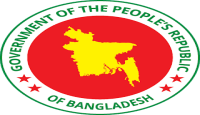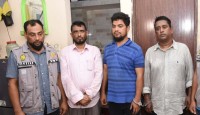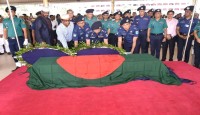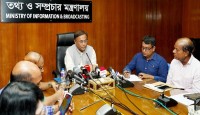Dr. Syeda Afroza Zerin and Shaila Ahmed
Dr Syeda Afroza Zerin
Associate Professor
Department of Law
American International University Bangladesh
Shaila Ahmed
Senior Assistant Professor
Department of English
American International University Bangladesh
The elderly people constitute more than half of the population today than ever before in Bangladesh. Elderly people are the most vulnerable class of people in our country and according to article 27 and 31 of the Constitution of Peoples Republic of Bangladesh they deserve the equal protection of law and equality before law. But in our country, most of the elderly people are getting deprived from their fundamental rights. The liberties of senior citizens people are given in the Constitution of the People’s Republic of Bangladesh. Where it is stated that even though a person is an elder person, he/she should get equal protection under the law and equal treatment of law in Bangladesh. Old age is a natural consequence of human life. In developed countries over 65 years old people are considered as senior citizen. UN has declared that above 60 years old people will be treated as senior citizen. When people become senior citizen, we should give special care and facilities for them. In this article, we shall try to identify the rights of senior citizens in Bangladesh and will discuss about how to do welfare of the senior citizen in Bangladesh. Article 15(d), titled 'Provision of Basic Necessities,' of Part II of the Constitution, titled 'Fundamental Principles of State Policies,' stipulates that all citizens must have access to necessities. Article 15 of the Constitution mandates the provision of fundamental necessities for all citizens, including food, clothing, shelter, education, and medical care.  Examples include equality before the law and equal protection of the law (Article 27), the non-discrimination principle (Article 28), and the protection of the right to life and personal liberty (Article 32). The recently enacted Parents' Maintenance Act, 2013, is the most important law in Bangladesh for ensuring the welfare of the elderly. Maintenance of Parents Act, 2013 Elderly people are protected by this Act which ensures the right to food, cloth, shelter, medical facilities for parents and grandparents under sections 2 & 4 of the said Act. In the event that the parents live apart, the children are liable for maintenance. Bangladesh established a program implementation plan to protect senior citizens' health and guarantee access to healthcare. With a skillful and special attention on the establishment of a sustained health system and improved and responsive efficient human resources, this program seeks to provide an efficient and sustainable health care delivery and management system. The Bangladeshi government recently passed the Parent Care Act 2013 in an effort to require children to take the required precautions to care for and support their parents for three years.
Examples include equality before the law and equal protection of the law (Article 27), the non-discrimination principle (Article 28), and the protection of the right to life and personal liberty (Article 32). The recently enacted Parents' Maintenance Act, 2013, is the most important law in Bangladesh for ensuring the welfare of the elderly. Maintenance of Parents Act, 2013 Elderly people are protected by this Act which ensures the right to food, cloth, shelter, medical facilities for parents and grandparents under sections 2 & 4 of the said Act. In the event that the parents live apart, the children are liable for maintenance. Bangladesh established a program implementation plan to protect senior citizens' health and guarantee access to healthcare. With a skillful and special attention on the establishment of a sustained health system and improved and responsive efficient human resources, this program seeks to provide an efficient and sustainable health care delivery and management system. The Bangladeshi government recently passed the Parent Care Act 2013 in an effort to require children to take the required precautions to care for and support their parents for three years.  However, it is not yet completely operational. Many aged welfare organizations advocate on behalf of seniors and encourage them to get active with them. Including Probin Hitoishi Kendra, Probin Hitoishi Sangha, Retired Officers Welfare Association, Retired Police Officers Welfare Association, Service Center for Elderly People, Elderly Development Initiative, Senakalyan Sangstha, and Bangladesh Association for the Aged and Institute of Geriatric Medicine (BAAIGM). There are programs for the elderly being implemented by the government, NGOs, and social organizations, but they are insufficient to serve the entire old population of Bangladesh. Bangladeshi elderly people rarely have adequate access to their rights and entitlements, despite national and international instruments. Moreover, elderly persons are denied human rights due to lack of awareness. In our society, most of the people are not aware about the right of the elderly people. To ensure older person enjoyment of their human rights and fundamental freedoms, our country is under the obligation to respect, protect, promote, and fulfil these rights. It is the responsibility of our state to provide for all the older people to fulfil their potential to lead dignified, healthy and secure lives. They should make sure that the rights of disadvantaged older people to economic and physical security; healthcare and social services are available and support in their care giving role across the generations. The right to be free from all forms of discrimination for elders shall exist.Older persons are often denied enjoying human rights and fundamental rights because of their age. This discrimination must be eliminated, and the family should come forward to combat discrimination and foster equality.
However, it is not yet completely operational. Many aged welfare organizations advocate on behalf of seniors and encourage them to get active with them. Including Probin Hitoishi Kendra, Probin Hitoishi Sangha, Retired Officers Welfare Association, Retired Police Officers Welfare Association, Service Center for Elderly People, Elderly Development Initiative, Senakalyan Sangstha, and Bangladesh Association for the Aged and Institute of Geriatric Medicine (BAAIGM). There are programs for the elderly being implemented by the government, NGOs, and social organizations, but they are insufficient to serve the entire old population of Bangladesh. Bangladeshi elderly people rarely have adequate access to their rights and entitlements, despite national and international instruments. Moreover, elderly persons are denied human rights due to lack of awareness. In our society, most of the people are not aware about the right of the elderly people. To ensure older person enjoyment of their human rights and fundamental freedoms, our country is under the obligation to respect, protect, promote, and fulfil these rights. It is the responsibility of our state to provide for all the older people to fulfil their potential to lead dignified, healthy and secure lives. They should make sure that the rights of disadvantaged older people to economic and physical security; healthcare and social services are available and support in their care giving role across the generations. The right to be free from all forms of discrimination for elders shall exist.Older persons are often denied enjoying human rights and fundamental rights because of their age. This discrimination must be eliminated, and the family should come forward to combat discrimination and foster equality.  The right to be free from all forms of violence shall apply to elderly people. Elderly individuals are frequently the targets of abuse, including financial, psychological, sexual, physical, and verbal exploitation. These are viewed as obstacles to older people's ability to exercise their full range of human rights. They pose a threat to the elderly person's dignity and self-respect. As a result, steps must be taken to spread awareness about all forms of exploitation and create services to stop it. Social Security should be a right for the elderly. The ability to exercise all of one's rights depends on economic empowerment. Elderly folks frequently lack financial security like pensions and other social security benefits. In actuality, poverty is the biggest threat to the welfare of senior citizens, because poverty and aging are frequently interrelated. In order to solve this issue, it is crucial that all elderly persons receive a non-contributory, state-funded pension, regardless of their financial situation. Elderly persons have a right to quality medical treatment. Elderly people are entitled to the best physical and mental health care available, including palliative, preventative, curative, and rehabilitative care.
The right to be free from all forms of violence shall apply to elderly people. Elderly individuals are frequently the targets of abuse, including financial, psychological, sexual, physical, and verbal exploitation. These are viewed as obstacles to older people's ability to exercise their full range of human rights. They pose a threat to the elderly person's dignity and self-respect. As a result, steps must be taken to spread awareness about all forms of exploitation and create services to stop it. Social Security should be a right for the elderly. The ability to exercise all of one's rights depends on economic empowerment. Elderly folks frequently lack financial security like pensions and other social security benefits. In actuality, poverty is the biggest threat to the welfare of senior citizens, because poverty and aging are frequently interrelated. In order to solve this issue, it is crucial that all elderly persons receive a non-contributory, state-funded pension, regardless of their financial situation. Elderly persons have a right to quality medical treatment. Elderly people are entitled to the best physical and mental health care available, including palliative, preventative, curative, and rehabilitative care.
The provision of healthcare for senior citizens in various locations, including hospitals, nursing homes, old age homes, and other shelters, should fall under the legal protection of human rights.Elders are traditionally regarded as the society's protectors and counselors. Even at an early age, they made contributions to the family and the social development in many ways. However, as they age, they struggle to live peacefully and become cut off from their families and society as a result of a lack of competent care, social awareness, codified law, and a robust monitoring system. They are entitled to the best possible protection and care for their bodily and mental wellbeing. To defend the legal rights of elderly persons, community duty is important and top priority.
To safeguard and preserve their rights as older people (health and medical facilities, shelter and social security, food and nutrition, clothing, recreation, job, etc.), family, society, government, and nongovernmental organizations can play a crucial role. Furthermore, it is the duty of society to provide these senior citizens first priority in receiving all civic services, such as from hospitals, banks, offices, and courts. The provision of healthcare to the aged at various locations, including hospitals, nursing homes, old age homes, and other shelters, should fall under the legal protection of rights, and there should be an effective legal remedy system in place to prevent rights violations. It is our moral obligation to create thorough protection and prevention measures into the law in order to stop elderly people from suffering and allow them to live quietly.











